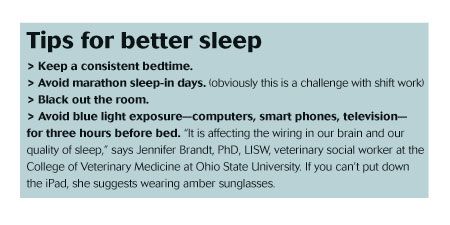Build a strong foundation for peak performance
It may seem simple, but experts say wellnessphysical and emotionalbegins with basic fundamentals to protect you when times get tough.
Basic wellness isn't a new concept. Everyone knows-especially in medical professions-to drink water, eat nutritionally, exercise regularly and get good quality sleep to be healthy. The problem is in the execution.

But what if simply choosing water instead of another energy drink, an apple instead of another bag of chips, a regular walk before or after work or turning off the tablet earlier for a better night's rest helped you feel, well, better?
This provides a foundation for well-being, says Jennifer Brandt, PhD, LISW, veterinary social worker at the College of Veterinary Medicine at Ohio State University. Simple steps like drinking water and eating better, exercising and getting good sleep is not stigmatizing. “No one is going to be embarrassed to say I'm working on my fluid intake,” Brandt says.
Once of a foundation of physical health is established, Steve Noonan, DVM, certified career coach, says positive psychology can arm you further. “We can redirect the increase of mental illness when we use strategies from positive psychology to stay healthy.
“I know what it's like when you're so busy you don't pee until 9 o'clock at night,” Noonan says. “I get that, but there is room.”
He also gets that practitioners may not have time for a 30-minute yoga session at lunch-it may be difficult to squeeze in lunch at all some days-but taking time for yourself throughout the day should be a priority. “There are so many little things you can do to fit into the model,” Noonan says referring to the demanding business model of today's veterinary practice.
He says 15 seconds is a break. “Take 15 seconds to take deep breaths before you walk into the exam room,” Noonan says. “It becomes a juggernaut. The self care starts propelling itself.”
Noonan subscribes to a long list of activities that positive psychology offers as a path to wellness, such as companionship, meditation, gratitude, kindness, compassion, finding something that engages you and understanding your strengths. And he offers five ways to be mindful of positive self-care at work:
> Slow your breathing. Before entering an exam room to see a client and patient, stop and take five slow breaths.
> Do a little stretching. With closed eyes, reach slowly to the sky while breathing in for five seconds, then slowly return your arms to your side and exhale. Repeat five times.
> Feed your focus. Try eating your lunch as slowly as you can.
> Study the simple. Choose a random object such as a pen, a flower or your stethoscope and observe it very carefully for 60 seconds. See what you can observe that you may never have seen before.
> Walk the walk. Take a slow 10-minute walk and synchronize your inspirations and expirations with your footsteps. He says this can be amazingly relaxing.
Better self-care leads to better efficiency, he says. You might even get caught up enough to take that seemingly unattainable 10-minute walk. “You cannot discount the value of these ultra mini-vacations that bosses can't take from you-like going pee,” Noonan says. “Take those breaths before going to the exam room. No one can take that.”
For more on positive psychology, go to dvm360.com/noonan.
